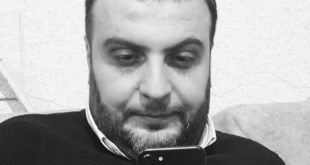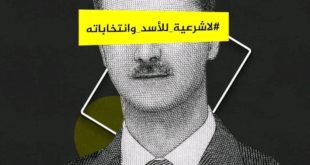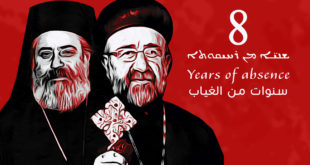A truck flying a Kurdish flag followed a vehicle near Afrin in northern Syria that bore the body of Ibrahim Mohammad, one of the demonstrators said to have been killed by the police.
People lined the route to the graveyard along streets still scarred by the burn marks of tyres from Tuesday’s protest.
“We demonstrated yesterday and today and we will demonstrate tomorrow. We want our rights,” said a 46-year-old resident who wished to be identified as Neamat. Asked what were the rights she was demanding, she said: “We want a homeland.”
Shops were closed in the small town and scores of police were standing guard at public offices and patrolling the streets but residents said there was no violence on Wednesday.
Basheer al-Saadi, head of the Assyrian Cultural Organisation told Reuters by telephone while touring several towns in the northeast that he saw no signs of renewed violence in the area.
“It seems that Kurdish parties now realise that things cannot continue this way because it is not in their interests or that of their people. We have been talking to them and trying to prevent further escalation,” Saadi said.
But in the city of Kameshli, residents said security forces arrested four Kurds attempting to torch a petrol station.
“They were trying to set a petrol station on fire. It is very close to a grain storage facility,” one resident told Reuters by telephone from the city.
Another resident confirmed the arrests, which took place late on Tuesday.
SOCCER VIOLENCE
Tensions began on Friday when five people were killed and hundreds injured after fighting erupted at a soccer match between supporters of a Kurdish team playing against an Arab team in Kameshli in northeastern Syria and caused a stampede by spectators trying to escape, residents said.
Sources in Turkey and Turkey’s Anatolian news agency reported more clashes in the following days that brought the death toll to 30, with about 50 people hospitalised.
Syria did not issue any figures of its own and denies ethnic tension is causing the trouble, blaming politically motivated troublemakers. A Syrian official also denied Tuesday’s Anatolian report that its forces opened fire on Kurdish protesters in northern Syria.
Rasheed Shaaban, a Kurdish activist, said police shot dead five people including a 16-year-old boy and a woman during demonstrations in Aleppo and Afrin to commemorate the killing of 5,000 people in a 1988 chemical weapons attack on the town of Halabja in a Kurdish region of northern Iraq.
Shaaban said he attended the funerals of four of the people, whom he said were killed by police bullets.
Since a U.S.-led invasion toppled Iraq’s Saddam Hussein last year, Syria and Turkey have opposed any moves to strengthen Kurdish autonomy in northern Iraq, fearing it could ignite similar aspirations among their own Kurdish populations.
Syrian officials avoid reference to Kurds as a distinct minority and stress the importance of national unity. Kurds and other minorities have held senior government and army positions.
NATIONALISM
Kurds make up about two million of Syria’s 17 million people. They have often said they want equal rights to Syrians and demand citizenship for about 200,000 stateless Kurds.
None of the 12 active Kurdish political parties or groups in Syria say they seek a breakaway state, but witnesses have said that rioters chanted slogans expressing this aspiration.
“There has been a rise in nationalist feeling among Syria’s Kurds, but there are several factors at work,” Syrian political analyst Samir al-Taqi said.
“What was realised for the Kurds in Iraq, especially after the interim constitution, helped create a political opportunity for this phenomenon, although this nationalist feeling among Syria’s Kurds was always present.
“What is required now is a containment of the incident. The state must fully regain its role,” Taqi said by telephone from Damascus. “Then there were some issues the Kurds had demanded. No doubt, it is time to look into these.”
 Assyrian Democratic Organization ADO
Assyrian Democratic Organization ADO





